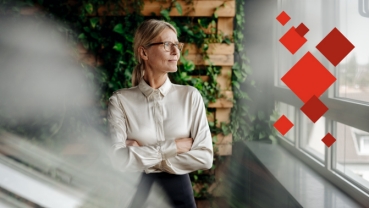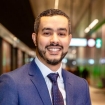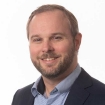
Jeanine Tijhaar, CFO Eneco Group
Jeanine Tijhaar has been with Eneco since 2017 and joined the Board of Directors of Eneco Group in February 2021. As CFO, with risk in her mandate, she leads the finance transformation at Eneco and aims to make a significant contribution to accelerating the energy transition. Apart from these major ambitions, she also has an eye for the people who help to realise these ambitions. Through her coaching style of leadership, among others, she strives for an inclusive work environment. In an interview with PwC's risk experts Zouhair Taheri and Sean Saturday, Tijhaar elaborates on how she wants to make an impact as CFO.

Jeanine Tijhaar, CFO Eneco Group

Inclusive environment
‘Let me start by saying that I’m grateful for the warm welcome I’ve received in the Board’, says Jeanine Tijhaar. 'An environment in which you are seen and heard and have the ability to be yourself (and to speak out your inner truth) is important for everyone to make an impact. This also applies to me. An inclusive environment is a condition for creating a high-performance culture’.
‘The role of CFO is more outward-looking than my previous role, and I enjoy developing in this aspect’. Self-development through education and training is a great passion of Tijhaar. This also applies to helping other people in their growth and development, with a view to contributing to a more inclusive work environment. For the past three years, for instance, she has followed a training on coaching.
‘I enjoy spending time with family, reading books and walking in nature with the dogs. Walking gives me time for reflection. However, integrating these moments of reflection into my daily work remains a challenge for me. In nature, I can reflect more easily and think about the long term. To be successful as a leader, you have to be able to switch between several “time horizons”’.
Legacy
Tijhaar already knew Eneco well, it was therefore easier for her to make an impact from the start in her new role as CFO on the Board of Directors. ‘From my predecessor (Guido Dubbeld) I received some good advice: "Before you start, think carefully about what legacy you want to leave behind"’.
Tijhaar followed this advice by formulating three main areas in which she wants to make an impact: make a significant contribution as CFO in resolving the climate problem by accelerating the energy transition; lead the finance transformation and Implement a “caring and daring” leadership style.
Care and dare
To successfully achieve these three objectives, Tijhaar follows what she calls a "caring and daring leadership style", based on the management book Care to Dare - Unleashing Astonishing Potential Through Secure Base Leadership, by George Kohlrieser. ‘"Dare" is about the "hard" side’, says Tijhaar. ‘Like setting ambitious goals, defining tasks and responsibilities. "Care" is about "making each other successful", for example by working together and listening to each other without judging. Both aspects are needed to be successful’.
Risk management
‘“Daring” is also about seizing opportunities and that involves risks', says Zouhair Taheri. 'How do you view risk management?’ Tijhaar: 'In the past, we at Eneco mainly talked about operational and tactical risks, whereas now we also talk about risk at a strategic level, and I mean risk integrated across the entire value chain'.
‘Of course, we also address all risks around financial reporting because that is a basis for discussing strategic risks as well. When you think of an offshore windtender where, among other things, interest rates, electricity and steel prices are risk factors. In the Board of Directors, you weigh various scenarios, recognising the risks while remaining competitive’.
Risk as a value enabler
Sean Saturday: 'At PwC, we also see risk as a possible value enabler, because instead of not doing something because it is risky, you can also integrate the risk into your decision to do something'. Tijhaar: 'A good example is cybersecurity; instead of trying to exclude all risks, we are now more focused on cyber resilience and digital trust. Risk can ultimately create value’.
‘It's about seeing to what extent our customers have real digital trust in us and are open to solutions around cyber technology, for example. Think about remote control of solar panels or an e-boiler. If we can build a proposition around that, it can be beneficial for both parties. Trust is crucial here’.

'I really see risk as a joint responsibility since it cuts across the entire organisation'.
Risk as a common responsibility
‘At Eneco, the CFO is also responsible for risk, while other companies have a CRO on the board. How do you view this?', asks Taheri. Tijhaar: 'Take the current volatility of the energy prices. As CFO, I have to be on top of this to prevent problems. To be able to cope with both high and low prices, you have to build a robust portfolio with sufficient flexibility in the system. The finance discipline has a crucial role to play here’.
‘I have risk in my mandate, but as a board we discuss strategic risks and related dilemmas together. I really see risk as a joint responsibility since it impacts the entire organisation’.
Increasing legislation and regulation
Saturday: ‘PwC's CEO Survey shows that many boardrooms are concerned about increasing regulation. How do you see this?' Tijhaar: 'I think that if a company waits for legislation and regulations before it does something, it is actually already too late. That’s why I think speed is so important. It's about taking responsibility for the climate problem, also in the finance function’.
‘If you really want to lead by example, you should start taking actions now to provide reasonable assurance on, for example, net zero KPIs such as CO2 emissions, even though legislation and regulations only require you to do so in two- or three-years’ time. We have already started this process within Eneco. It contributes to providing extra transparency to our stakeholders, but it also helps to make our own business processes more robust’.

'I think that if a company waits for legislation and regulations before it does something, it is actually already too late'.
Eneco's One Planet plan
Tijhaar: Eneco's ambition to be climate neutral by 2035 is expressed in our One Planet plan. In order to achieve the goals, we have developed a roadmap which defines how to achieve our plan. I see many companies still struggling with this aspect. Setting ambitious targets for CO2 reduction has limited value without a roadmap. Defining the ambitions as well as the roadmap with our new shareholders has been a rewarding process as these are important decisions on which we must agree’.
‘With the One Planet plan, we recognise the urgency of mitigating climate change and at the same time express the desire for our organisation to contribute to solving this problem. I am really touched when I see how many clients come to us because they want to make a positive contribution together with us’.
‘When you work from a desire rather than a fear, others want to join in. Worrying results from climate reports do not always get companies moving, but if you talk from a positive desire, it helps’.
Finance organisation as purpose-driven enabler
Taheri: ‘Do you see finance as a potential enabler as well as a supporter?’ Tijhaar: 'The finance organisation has an important role in the transition to a sustainable future. In the implementation of the One Planet plan, we do this by balancing between the short and the long term. Jeroen Smit has said important things about this in his book on Unilever’.
‘Unilever CEO Paul Polman ultimately failed to convince his shareholders (focused on short term results) on his Sustainable Living Plan, despite his impressive results in the share price. My main conclusion is that a mentality change is needed among all stakeholders. I believe that purpose drives profit, especially when you have the “first mover advantage”. I am glad that we have Japanese shareholders at Eneco as they are known for their long-term vision’.
Non-financials in the finance domain
Returning to the purpose-driven role of finance, Tijhaar says that this is also reflected in the portfolio analyses. ‘For example, we look at which product-market combinations we can accelerate when it comes to reducing the CO2 footprint'. Taheri: 'So non-financials are increasingly entering the finance domain?' Tijhaar: 'I do indeed expect that the CFO of the future will be increasingly involved with non-financials. But finance will also remain the enabler, ensuring that the resources and systems are in place to do that’.
Taheri: ‘In the financial context you have IFRS, of course, but for non-financials these standards still have to be made. The knowledge and experience of finance can be useful here’. Tijhaar: 'I agree. I immediately think of the podcast Putting Purpose into Practice in which two specialists from Oxford present a way to integrate non-financials into financial reporting. I highly recommend this podcast’.

'The finance organisation is an enabler to achieve the long-term goals of a company'.
Finance transformation
‘I see a link between the "care" idea and promoting a transformation in your clients’, says Taheri. ‘But you are also in the process of a transformation yourself. Can you say anything about that?' Tijhaar: 'The finance transformation we started is actually the redesign of the entire finance organisation, including systems, processes, data, management information and financial reporting, including the implementation of J-SOx. That is a huge operation’.
‘We hope to have SAP S/4HANA live in all countries by 2023 and this will create many new opportunities. In the future we will be able to use machine learning applications to do predictive forecasting, for example. We are now laying the foundations’.
Leadership and cooperation
'In addition to building capabilities in "hard" skills such as data analytics, we are also working on skills in the areas of leadership and collaboration. Our ambitious agenda calls for collaboration across different business units and value chains, but also for top management to give trust and ‘room to manoeuvre’ to their teams to deliver on our ambitions together’.
‘Collaboration is also crucial in the energy transition since this transition is so complex and wide-ranging that it cannot be achieved within the confines of one's own position. We must get out of our silos and work together with stakeholders as a network organisation on strategic issues. Whether it's about building an offshore wind farm or the heat transition in The Hague’.

Advice to leaders working with risk
Saturday: ‘Can we extend this to risk? What advice would you give to leaders who are working on risk?’ Tijhaar: 'My advice is: spend more time on soft controls. Risk management is often only about hard controls, such as documentation and checklists. We do that too, of course, but a good risk environment also requires soft controls. So, work on trust with stakeholders and clients around digital trust, but also work on an inclusive work environment in which people dare to speak out and name risks’.
‘Another piece of advice is to use technology to do strategic risk analysis, for example, realising predictive forecasting through digitisation. As I said before, it is important to focus not only on risks, but also on opportunities and the creation of value. Because I think that ultimately makes you more resilient’.




















